Significant lump sum expenses, such as home renovations, weddings, education funding, or a real estate purchase, often require more cash than you may keep on hand. Funding these purchases carries long-term financial implications that should be coordinated with your broader strategy to ensure they do not unintentionally disrupt your progress toward other vital goals.
The first step is to quantify the total cost. Home renovations frequently exceed initial estimates due to design changes, supply chain delays, or unforeseen issues. Weddings can often include multi-vendor contracts, travel, and event insurance, all of which add to the budget. Education costs go beyond tuition, including room and board, travel, books, and technology.
Financing a vacation home or investment property brings a new set of considerations like down payments and closing costs. Even if you are buying a property outright, homes often come with additional costs for initial repairs, upgrades, or customizations. You should plan for expenses such as painting, landscaping, and minor renovations to tailor the space to your preferences. In addition, furnishing and decorating a home can be a significant outlay, especially if large appliances are not included in the purchase.
It is also important to consider carrying costs for property ownership over time. This includes property taxes, insurance, utilities, maintenance, and property management fees, if applicable. These expenses can add up quickly and should be modeled into your cash flow to determine if the property is financially sustainable in the long term.
Large expenses may be funded through cash savings, investment accounts, debt, or a combination thereof. When deciding whether to take a loan vs. liquidating part of your portfolio, weighing the cost of borrowing against your expected investment returns is essential. This analysis should include the potential realization of capital gains, the timing of distributions, and the tax implications. Selling appreciated securities can generate taxable gains, while withdrawals from tax-deferred accounts may increase ordinary income in the year they are taken. For education funding, the nature of the expense may allow you to incorporate savings from 529 plans or utilize the gift tax exemption for education funding.
Free Planning Resource
Tax facts summary and a high-level view of what should be happening with your financial plan throughout the year.
Download the Financial Planning Calendar
You can avoid unnecessary disruptions to your investment plan by coordinating the timing of large expenses with your available liquidity. For near-term needs, using cash reserves or fixed income investments allows you to cover costs without selling long-term assets like stocks. When these projected expenses are longer-term, setting aside funds in a taxable account or gradually saving toward the goal can help you avoid selling investments during a market downturn or drawing taxable distributions from retirement accounts.
Taking large, unplanned distributions can also throw off your asset allocation, potentially changing the risk level of your overall portfolio. Planning in advance gives you flexibility while keeping your investment strategy on track.
Beyond the numbers, these major financial decisions could involve adult children or relatives. Open communication is critical if you are helping a family member with education costs, contributing to a wedding, or planning to co-own a property. Clarifying roles, responsibilities, and intentions helps avoid misunderstandings. These conversations also provide a chance to communicate your values and explain how your financial decisions are intended to support your family over time.
Here's a basic view of the advantages and disadvantages of funding options for significant expenses:

At Carnegie, we take a comprehensive approach to financial planning. We help clients evaluate large financial decisions, assess funding strategies, model cash flow and tax impact, and coordinate each piece within your broader investment strategy. Proper planning can help you approach these large expenses with confidence, ensuring they fit within your financial plan and reflect your priorities. We are here to help ensure your financial decisions support both your present needs and your long-term goals.
Need Financial Guidance?
Contact us for a no-obligation conversation to discuss your financial questions and concerns.
For informational and educational purposes only. The information is not intended to provide specific advice or recommendations and the information has been obtained from sources believed to be reliable. Please consult with tax, legal, and financial advisors as laws and interpretations are subject to change, and your circumstances may be unique. Opinions are subject to change.
Carnegie Investment Counsel (“Carnegie”) is a registered investment adviser with the Securities and Exchange Commission. Registration as an investment adviser does not imply a certain level of skill or training. For a more detailed discussion about Carnegie’s investment advisory services and fees, please view our Form ADV and Form CRS by visiting: https://adviserinfo.sec.gov/firm/summary/150488.
You may also visit our website at: https://www.carnegieinvest.com


